'A guardian angel': New Dell Children's hospice program helps families through death, and life
Sarah and Travis Abraham looked into the face of their son Paxton moments after his birth in August. He was small, really small, just 3 pounds, 12 ounces, but his eyes were open, Travis Abraham said, and he was hungry immediately.
He looked like his dad, or maybe brother Asher, except for some key differences. He had clenched fists, a club foot and an abnormally large head with strangely shaped ears.
Paxton was born with trisomy 18, which happens when someone has three copies of chromosome 18 instead of two.
The Abraham family had been planning for his birth for months — as well as for his death. They were told he might die in utero or he might not live long after his birth.
Expanding care: Hand to Hold, Dell Children's partnership supports more families with babies in the NICU
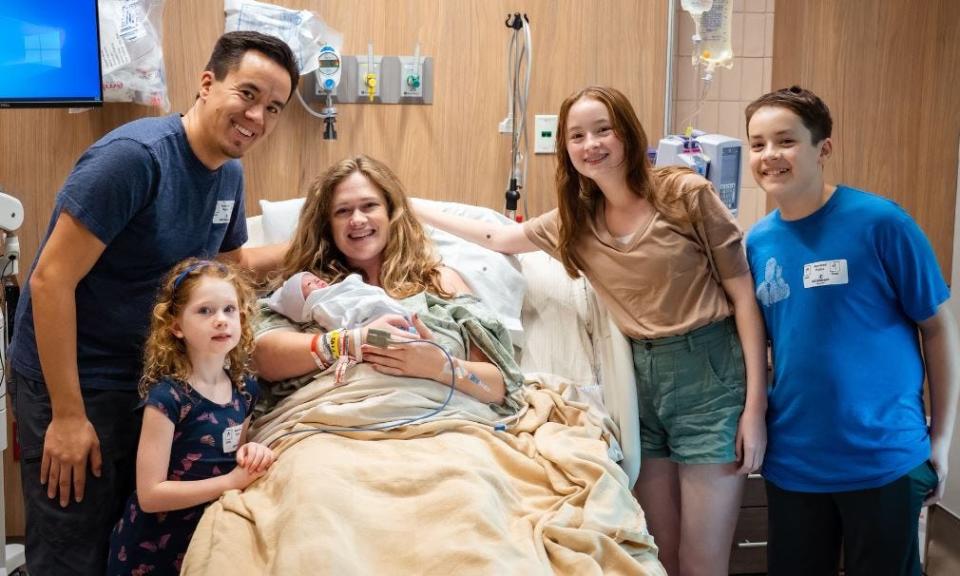
What they hadn't prepared for was his life.
The new pediatric hospice program at Dell Children's Medical Center of Central Texas helped them do that. It is the only pediatric hospice centered in a children's hospital in Texas.
Before the hospice program began in May, young Dell Children's patients who had life-limiting diseases and were expected to die within six months would receive services through other hospice programs, such as Hospice Austin.
That meant the family would have a new team, said Dr. Patrick Jones, the section chief of pediatric palliative care at Dell Children's as well as the co-lead, along with nurse Sasha Griffith, for Dell's Children's at Home, the new hospice program.
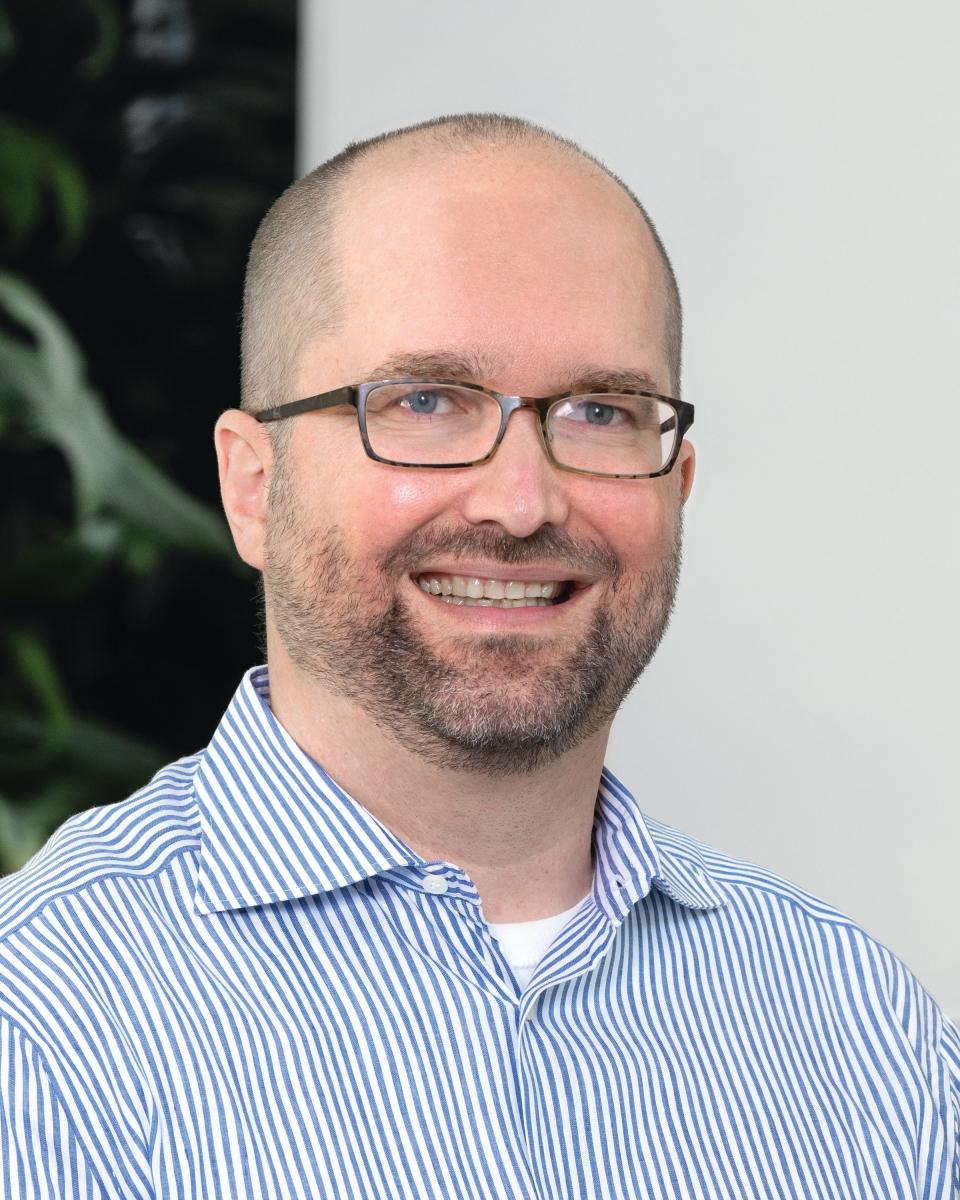
"At a time where there is potentially a lot of stress and need for support, the idea that you have to convert to a completely new team wouldn't be consistent with care or the message that we want you to stay here in Austin for specialized care, even if our attempts at a cure doesn't rise to the hopes they had," Jones said.
In the past, at other programs, families would have care from pediatric nurses during the week, but after hours and on the weekends, they had to rely on on-call nurses who often were more familiar with adult care, Jones said.
Starting Dell Children's at Home is a great opportunity, Jones said.
"We want to build a program that is so integrated (that) when they go on hospice and they receive those types of services, it would be the same people," he said.
'A 50-50 shot': How a Dell Children's team used a risky heart surgery to save a tiny infant
Not giving up hope
Pediatric hospice care is different from adult hospice. The Affordable Care Act allowed Medicaid to continue to pay for curative services for children on hospice, which is not permissible with adult hospice services. Pediatric hospice becomes an extra level of services that they receive.
When Jones talks to families about going on hospice care, he tells them, "The word is going to sound frightening, and that word is hospice."
They have an honest conversation with the families about what caregivers are observing ― that based on the medical condition, death within the next six months would not be surprising, Jones said. "This is not to extinguish hope," he said. "Families can hold this information on one hand and hold this beautiful hope on the other. ... We want to be honest with them that this is what we are seeing."
Families get to take their children home and have care come to them. If there are treatments or procedures that are available, families can still opt to have them done. Families get to decide what they want the next months to look like for their child.
'Beautiful memories': Parents honor daughter's life by helping sick kids experience joy
This is the second hospice program Jones has set up. He ran the hospice program, which covered adults and children, at Memorial Hermann Health System in Houston and was the medical director of the pediatric program there.
When he came to Dell Children's to lead the palliative care team, he saw the gaps and the difficulty for parents shifting from care within the hospital system to hospice outside of it. He knew how to change that.
Children's hospitals typically have a robust palliative care program — which focuses on making children comfortable — but "getting into the business of going into people's homes is a completely different operation," Jones said.
There can be magic when the kids are cared for at home instead of in the hospital, Jones said. Sometimes they outlive their projected life expectancy because they are home, Jones said, and about 10% actually come off hospice care.
"It is immensely beautiful," Jones said.
"We're invited into people's homes," he said. "You build relationships into beautiful moments. You have been able to allow them to have as much time together."
Mental health: How to navigate holiday grief after the loss of a loved one
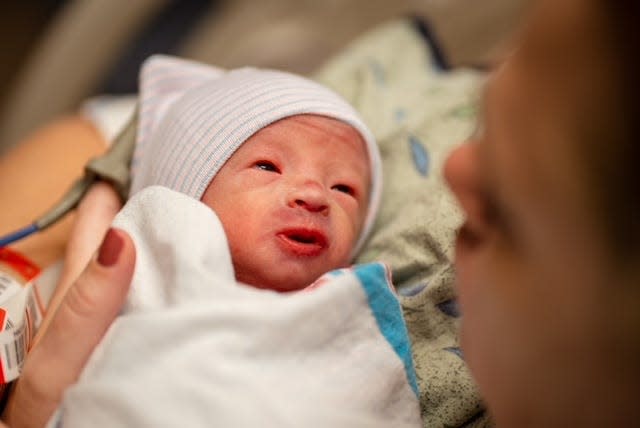
Getting to be parents
The mantra of the hospice team is "no heroes."
"None of us are going into this to be the most important person in the room," Jones said. "We really focus on making the hero the child and the child's caregivers. We're going to support the family and help them advocate for themselves."
The Abrahams started working with palliative care and then hospice at Dell Children's when Sarah was about 5½ months pregnant. An early blood test at around 12 weeks indicated the possibility of trisomy 18. An ultrasound at four months confirmed it. Doctors also thought the baby had a heart condition that would require surgery soon after birth.
Sarah Abraham was told by an initial maternal fetal medicine doctor that "no doctor would ever do heart surgery on him and that he would die almost immediately at birth," she said.
She was given the option to fly out of state and terminate the pregnancy. But "we wanted him for as long as we could have him," she said.
They took it day by day. They were grieving, but also researching trisomy 18.
"We couldn't really celebrate it," Travis Abraham said of the pregnancy.
They had to explain what was happening to their three children, ages 7 to 14 at the time. Their youngest would tell them, "Miracles can happen."
They also had to figure how to deal with complete strangers who would see Sarah's pregnant belly and want to congratulate her. "We were stuck in the dichotomy of lying or ruining someone's day" if they responded that their baby was going to die, she said.
Soon after the maternal fetal specialist predicted death, at birth if not in the womb, the Abrahams began seeing doctors at the Comprehensive Fetal Care Center at Dell Children's and planning for palliative care.
Sarah Abrahams would be able to give birth at Dell Children's in the labor and delivery unit, which opened in July 2021 specifically to enable healthy mothers with very sick babies to deliver where their child's specialists are.
They planned a cesarean section at 36 weeks because of the heightened risk with trisomy 18 babies that the placenta stops working. In Paxton's case, it had slowed down.
On Aug. 12, the Abrahams' extended family and children all came to the hospital in hopes that they would get to see Paxton, if he survived delivery, before he died.
And then he arrived.
"He was perfect," Sarah Abraham said.
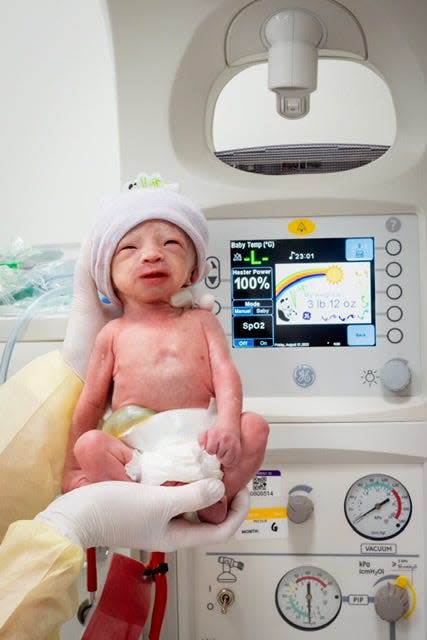
Taking Paxton home from Dell Children's
Paxton survived and did better than expected. Their older children were afraid to go home that night because they didn't believe he would be alive in the morning. A Dell Children's child life specialist had them draw pictures for Paxton to leave with him.
Paxton made it through the night. And he kept making it. His heart did have a defect, but it wasn't the bad one that had been predicted. Working with palliative care and his neonatology team, the family was able to decide the next steps.
"We didn't have a concept of hope at this point," Travis Abraham said. "We had already gone through the grieving process."
Now, they realized they could fight for his life. "We're going to fight for every second," Travis Abraham said.
They decided to take him home, to be on hospice care, but not to give up.
"We had nothing for a baby," Travis Abraham said. "Everybody said he would die."
For the next six weeks, Paxton stayed at home with them. He was having trouble getting enough to eat. A feeding tube needed to be put in. He spent five weeks in the neonatal intensive care unit, and then he went home again.
The family was planning on a heart surgery in November or December.
It was not to be.
Paxton developed an infection in his blood, caused by his weak intestines. He died Nov. 14.
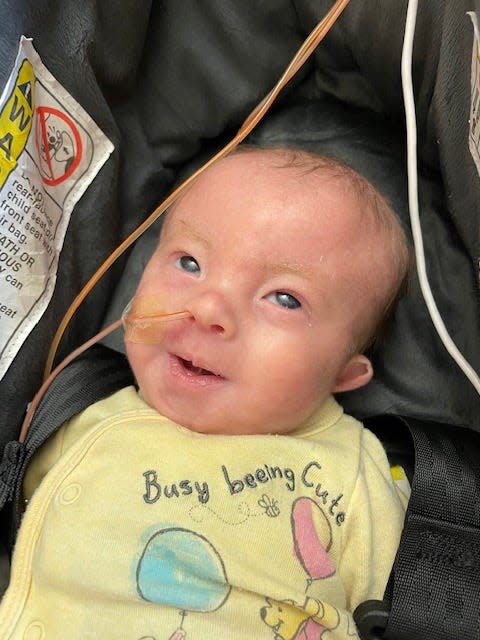
Grieving Paxton
The grief is not easy. "It hits hard and deep and takes a long time to process," Travis Abraham said.
The family has already been back to Dell Children's NICU to decorate for Christmas in Paxton's honor. They plan to make it a Christmas tradition. People also gave them Christmas ornaments in memory of Paxton that now decorate their tree at home. It will be a quiet Christmas.
They have other things to remember him from the hospice team: A stuffed lamb with a recording of Paxton's heart beat inside. A pendant with his fingerprint. His footprints framed.
Sarah Abraham wishes more families understood pediatric hospice.
"It doesn't mean that we're giving up," she said. "It just means we want our baby to be comfortable and loved, and we want the power to be able to make decisions as his parents."
The hospice team at Dell Children's made a big difference in Paxton's life and his death and in the way the family has been able to deal with it, the Abrahams said.
"They empowered us to fully be parents, to seek the right knowledge, to help us ask the right questions," Travis Abraham said. "They gave us the freedom to grieve. They were with us to fight for the things we wanted."
They call their hospice nurse their fairy godmother.
"She had a way of walking into the room, and even (Paxton) would recognize her voice. She's a guardian angel," Sarah Abraham said.
"What surprised me about (the hospice team) is their level of hope and also their ability to celebrate milestones," Sarah Abraham said.
It is different from having a healthy child, but they celebrated the first diaper change, first feeding tube change, first surgery.
"We never felt like we were approaching death," Travis Abraham said. "We were truly caring for somebody who mattered to everyone. Everyone along the way truly loved him. A lot of them became family."
This article originally appeared on Austin American-Statesman: Dell Children's begins new hospice program in Austin

